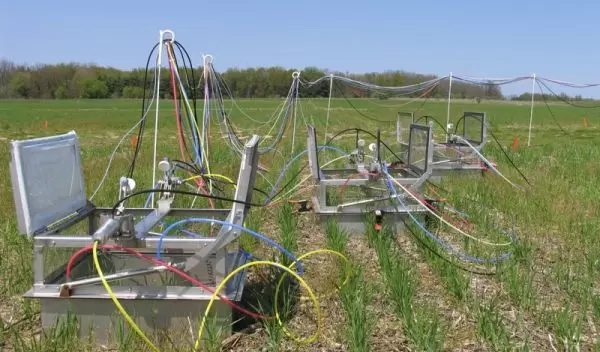
New land-use strategies can reduce greenhouse gas emissions
Find related stories on NSF's Long-Term Ecological Research Program at this link.
The most common strategies for lowering greenhouse gas emissions involve reducing the use of fossil fuels such as coal, gas and oil.
While these fossil fuels are the largest contributors of greenhouse gases, especially carbon dioxide (CO2), other sectors of the global economy can also contribute substantially to greenhouse gas emissions -- and efforts to reduce them.
A new analysis published this week in the journal Nature and led by soil and crop scientist Keith Paustian at Colorado State University (CSU) shows that changes in land-use practices can also help reduce levels of greenhouse gases in the atmosphere.
Land use: A key role
"No matter what approach we take to reducing greenhouse gas emissions -- whether it is the use of fossil fuels, changes in how we manage the production supply chain or new innovations in agriculture -- land use plays a key role," Paustian said. "What needs to change is how we incentivize new land-use strategies for farmers, ranchers and producers."
One difficulty in using improved land-use practices as strategies for greenhouse gas reductions is that land use-related emissions, and how to best reduce them, come with more scientific uncertainty than approaches like fossil fuel replacement.
But emerging research and information technology developments offer promise in reducing these uncertainties, Paustian said, and for paving the way for policies that make use of the large greenhouse gas mitigation potential available through improved land use and management.
Land use, soils and ecosystem services
The answers may lie in soils.
"The beauty of soils is that they can be managed to provide ecosystem services often ignored," said paper co-author Phil Robertson of Michigan State University and the National Science Foundation's (NSF) Kellogg Biological Station Long-Term Ecological Research (KBS LTER) site. "Managing soils to become 'climate-smart' builds both ecosystem resilience against climate change and an important underutilized capacity to mitigate that change."
Added Lou Kaplan, a program director in NSF's Division of Environmental Biology, which funds the KBS LTER site, "These scientists highlight the role of basic research on soils in guiding strategies to reduce greenhouse gas emissions associated with agriculture, and ultimately to assist greenhouse gas mitigation."
One example of such developments is an online tool designed to help farmers and ranchers understand how their practices affect their carbon footprints.
New tools and approaches
The web-based tool, called COMET-Farm (which stands for CarbOn Management and Evaluation Tool), was developed by CSU in partnership with US Department of Agriculture's Natural Resource Conservation Service to help producers estimate their greenhouse gas footprints, and to evaluate alternative management practices through data unique to each farming or ranching operation.
Paustian noted that these new approaches and new tools will not only allow for increased engagement by farmers and ranchers, but also offer a chance for industry to become more actively involved in land-use issues.
"Land-use is as much a social issue as it is an environmental issue," Paustian said. "We need to develop the right policies and incentives for industry, and we need to do so by marshaling our scientific research and expertise."
Among other recommendations are generating more high-quality data about land-use effects on greenhouse gas emissions, and greater engagement with land users through education and outreach.
The study's other authors include: Johannes Lehmann, Department of Soil and Crop Sciences, Cornell University; Stephen Ogle, CSU Department of Ecosystem Science and Sustainability; David Reay, School of Geosciences, University of Edinburgh; and Pete Smith, Institute of Biological and Environmental Sciences, University of Aberdeen.
